|
|
|
Sort Order |
|
|
|
Items / Page
|
|
|
|
|
|
|
| Srl | Item |
| 1 |
ID:
162945
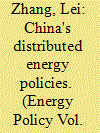

|
|
|
|
|
| Summary/Abstract |
Distributed energy (DE) is a way to cascade energy use near multiple users. It significantly impacts energy savings, emission reductions and energy structure upgrades. In recent years, all levels of the Chinese government have strived to introduce policies favorable to the implementation of DE. These policies have been affected by the timing of the introduction, regional economic differences, the degree of government attention, and many other complex factors. To clarify the development and links between these policies, this study summarizes and compares China's DE policies at national, provincial, and municipal levels, from 1989 to 2016. We analyze the scope and content of subsidies in detail, and then provide policy recommendations for DE development in China. The main results are as follows: (1) DE policies emerge from legal provisions in the areas of energy, electricity, and environmental protection. The policies have gradually evolved from macro-plans to specific guidance. (2) The demand for DE subsidies is increasing, making the back slope of subsidies significant under an insufficient government budget. Diverse subsidies are needed to address this contradiction. (3) Future policies should focus on comprehensive DE utilization, smart grids, research and development (R&D), and developing policy synergies at different levels.
|
|
|
|
|
|
|
|
|
|
|
|
|
|
|
|
| 2 |
ID:
047443


|
|
|
|
|
| Publication |
Honolulu, Pacific Forum CSIS, 1995.
|
| Description |
iii, 18p.
|
|
|
|
|
|
|
|
|
|
|
|
Copies: C:1/I:0,R:0,Q:0
Circulation
| Accession# | Call# | Current Location | Status | Policy | Location |
| 043375 | 355.033054/COS 043375 | Main | On Shelf | General | |
|
|
|
|
| 3 |
ID:
128348


|
|
|
|
|
| Publication |
2014.
|
| Summary/Abstract |
As a result of the current international climate change strategy, the European Commission has agreed on ambitious targets to reduce CO2 emissions by more than 80% until 2050 as compared to 1990 levels and to increase the share of renewable energy and improve energy efficiency by 20% until 2020. Under this framework, renewable energy generation has increased considerably in the EU and it is expected to keep growing in the future years. This paper presents long-term strategies for transmission infrastructure development to integrate increasing amounts of renewable generation in the time horizon of 2030-2050. These are part of the outcomes of the SUSPLAN project,1 which focuses on four possible future renewable deployment scenarios in different European regions taking into account the corresponding infrastructure needs, especially electricity and gas grids, both on regional and transnational level. The main objective of the project is the development of guidelines for the integration of renewable energy into future energy infrastructures while taking account of national and regional characteristics. Therefore, the analysis is based on a two-track approach: A transnational modeling exercise ("top-down") and in-depth case studies for nine representative European regions ("bottom-up").
|
|
|
|
|
|
|
|
|
|
|
|
|
|
|
|
| 4 |
ID:
191263
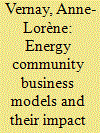

|
|
|
|
|
| Summary/Abstract |
The need to accelerate the decarbonisation of the energy system has led to renewed interest in energy communities. Such communities are now identified by institutions as new instruments that can contribute to four main policy objectives: i) increase renewable energy capacity, ii) mobilize private capital, iii) provide flexibility for the electricity system, and iv) empower consumers. Within the frame of the historically centralised French energy system, we present five energy community business models (ECBMs) and explore the extent to which they contribute to the four aforementioned policy objectives. Our analysis shows that, while no ECBM has yet enhanced the flexibility of the grid, each ECBM contributes differently to realising three other policy objectives. We also show that the diffusion of ECBMs remains limited as a result of legal, organisational and financial barriers. We propose three recommendations that could help ECBM diffuse – protect economic viability, support intermediaries that facilitate the adoption of ECBMs, and nurture local governments as key enablers. Our outcomes are intended to guide policymakers by providing insights into which types of energy communities could contribute most significantly to the various policy objectives and provide recommendations to include them in their energy policy roadmaps more effectively.
|
|
|
|
|
|
|
|
|
|
|
|
|
|
|
|
| 5 |
ID:
115311
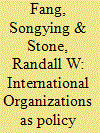

|
|
|
|
|
| Publication |
2012.
|
| Summary/Abstract |
How can international organizations persuade governments to adopt policy recommendations that are based on private information when their interests conflict? We develop a game-theoretic model of persuasion that applies regardless of regime type and does not rely on the existence of domestic constituency constraints. In the model, an international organization (IO) and a domestic expert have private information about a crisis, but their preferences diverge from those of the government, which must choose whether to delegate decision making to the expert. Persuasion can take place if the international institution is able to send a credible signal. We find that this can take place only if the preferences of the IO and the domestic expert diverge and the institution holds the more moderate policy position. This result contrasts with conventional wisdom, which holds that the necessary condition for IOs to exert influence is support from a domestic constituency with aligned preferences. Our model suggests that, far from being an obstacle to international cooperation, polarized domestic politics may be a necessary condition for IOs to exert effective influence.
|
|
|
|
|
|
|
|
|
|
|
|
|
|
|
|
| 6 |
ID:
149951
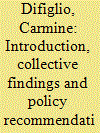

|
|
|
| 7 |
ID:
181760
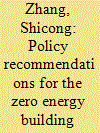

|
|
|
|
|
| Summary/Abstract |
The present global trend towards decarbonization under the Paris Agreement encourages regions and economies to explore possible ways to reduce energy intensity and minimize emissions into the environment. The Asia-Pacific Economic Cooperation (APEC), which accounts for 60% of world energy demand, aims to reduce energy intensity by 45% from 2005 levels by 2035 and double the share of renewable energy in the energy mix between 2010 and 2030. The promotion of Zero Energy Building (ZEB) was considered the most efficient way to respond to these goals in the building sector. A comprehensive review of progress over the past decade and a comparison of the definitions, standards and goals of ZEB in the five biggest economies of APEC (Canada, China, Japan, South Korea, and the United States) was carried out. In 2020, these five economies announced a carbon neutral goal towards 2050/2060, which will significantly affect the building sector in the foreseeable future. According to the progress review of ZEB over the last decade, this paper analyzes gaps in the building sector towards zero emissions by 2050 and proposes 10 policy recommendations covering multi-aspect and multi-factor in the APEC. The research will help steer more efficient and effective ZEB policies towards zero energy/emissions in the building sector in the Asia-Pacific region.
|
|
|
|
|
|
|
|
|
|
|
|
|
|
|
|
| 8 |
ID:
176885


|
|
|
|
|
| Summary/Abstract |
The threat of climate change has necessitated that nations make a switch to greener and more environmentally sustainable fuels. India's plans to promote electricity generation from solar energy is a positive step in this direction. Several states have come up with their own renewable energy plans to support this transition. Delhi's solar policy (2016) intends to contribute to this national plan. It was widely believed that Delhi's favourable geographical conditions for solar, relatively high literacy rate and good public awareness would aid good market penetration of rooftop solar (RTS). However, the expectations of the policy makers have been belied by a meagre adoption rate as RTS has met with a very lukewarm response from the residents of Delhi. The current study holistically explores the obstacles hindering the growth of Delhi's RTS market by integrating perspectives from solar vendors, implementing agencies' officials and users/potential users and suggests some policy measures to address the issues.
|
|
|
|
|
|
|
|
|
|
|
|
|
|
|
|
|
|
|
|
|